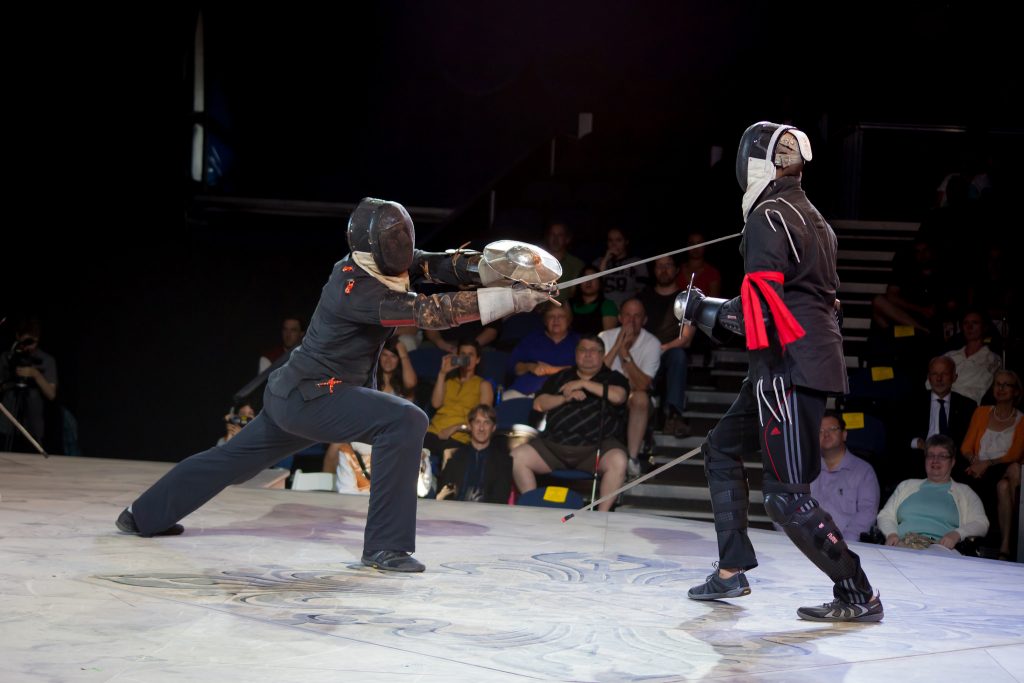Not irregularly I have had people say to me: I'm looking forward to starting into swordplay, I just need to get in shape first.
This makes me very sad. Not only is swordplay a wonderfully fun and fulfilling physical activity, it is also a great way to build physical health and to do so in a low impact way. So the short answer is that if you're not in shape, if swordplay inspires you, it is the place to start your journey into building strength, not end it.
How To Meet the Physical Challenges of Swordplay
The human body adapts itself in strikingly specific ways to the activities you request of it on a regular basis. I have had professional body builders struggle to hold up a sword for 5 minutes in my classes (and a typical sword weighs only between 2 and 3 pounds). One the best things you can do to develop the specific strength required to do swordplay is to: do swordplay.
It's All About Posture
Often what strains your body the most in a graceful activity like martial art is that you're holding up your limbs and your head with the wrong muscles. If you're applying the average desk hunch to your sword fighting posture you're more likely to be strained and to get tired quickly. Here is a video on posture that will help you set your body in positions that will make holding a sword up for an extended period a lot easier.
Connective Tissue for the Win
Swordplay is a physical activity that involves a lot of extension, balance, and management of momentum. That means that you'll be challenging many small muscle groups and your connective tissue (the ligaments and cartilage that work between your muscles and bones). Weight lifting routines often neglect this kind of tissue whereas gymnastic activities like swordplay require lots of varied and diverse movements while working with your body weight and the relatively light weight of swords. Done regularly with care and attention this can make your body significantly more resilient and healthy. However it's important to note that this tissue typically takes between 8 and 12 weeks to adapt to new routines, so pace yourself and don't exhaust yourself.
In the beginning of swordplay I recommend focusing on high quality reps of exercises and then take lots of little breaks. If you're using a single handed sword like the rapier or sidesword, switch hands frequently. It's awesome to develop ambidexterity and this will help you avoid repetitive strain while allowing you to practice for longer.
Massage
Blood flow is one of the great healers and drivers of adaptive change in the body. Using a foam roller, lacrosse ball, or your elbows (or strong fingers) to dig into the muscles around your joints will help increase circulation and will promote healing and strengthening if done regularly both after workouts and on recovery days.
Eat, Drink, & Sleep
Eat a healthy and well balanced meal an hour or two before class. Bring a nutritious snack to help keep your blood sugar up. Drink lots of water during and after a workout and make sure that you get some protein in your diet afterward to help with muscle development and recovery. And of course, get your 7-9 hours of sleep.
These can be big challenges in our very packed lives but if you've struggled to simply do it for your health in the past, perhaps recognizing it as part of your martial arts training will give you the necessary motivation to move it up in priority.
Just Do It
Everyone sucks at the beginning. In my first sword class my arm shook like a leaf after about 2 minutes of holding the sword. I was embarrassed at the time but now I realize the reason no one said anything is that it had been everyone's first experience.
Get started and stick with it. A regular and diligent practice will not only be fun but it will pay off a lot quicker than you expect and soon swords will not only feel light in your hands but like graceful extensions of your stronger and more capable body.
